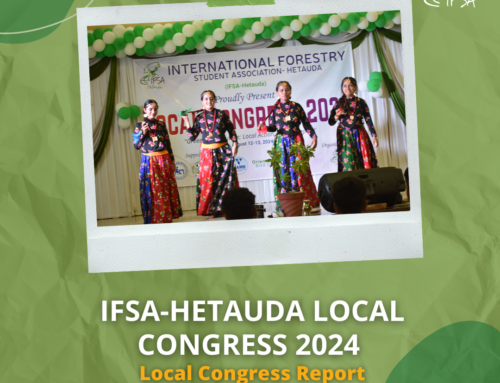Timber Legal Assurance System and FLEGT Implementation for Sustainable Forest Management
by: Caroline Tasirin
The Indonesian government hosted a side event addressing the progress and challenges on enforcing legal timber trade through state-enforced certification. The session was led by Dian Triansyah Djani and highlighted Indonesia’s Timber Legal Assurance System through a presentation by Indonesia’s Director General for Forestry Research, Development, and Innovation, Agus Justianto.
Indonesia has the third largest tropical forest in the world, amounting to almost 121 million hectares. Out of this, 46% is classified as production forest and 11% is classified as protected forest convertible to production, necessitating stringent measures to control the harvest of forest products. Indonesia demonstrates its commitment to ensuring legal timber harvest and trade through Sistem Verifikasi Legalitas Kayu (SVLK), its national instrument to verify the legality of its timber. SVLK started development in 2003 and was finalized in 2009. In 2013, online permit processing was enabled through the Sistem Informasi Legalitas Kayu (SILK) portal. SVLK ensures that all timber harvested, transported, manufactured, and traded from Indonesia comes from legal sources and in full compliance with Indonesian laws. SVLK certification is mandatory for all timber exported from Indonesia.
The ratification of SVLK opened new market opportunities for Indonesian timber. Indonesia started Voluntary Partnership Agreement (VPA) negotiations with the European Union (EU) in 2007, discussing how Indonesia’s SVLK could align with EU’s Forest Law Enforcement, Governance and Trade (FLEGT) licensing scheme. Seven years of negotiations led Indonesia to become the first country to export FLEGT licensed timber to EU. Australia and Japan have also accepted Indonesia’s SVLK certification, streamlining the due diligence process and simplifying export to these countries with illegal logging laws.
Implementation of SVLK has already shown impact on timber trade. Despite the longer period required to process licenses, certified timber comes with the assurance that it was harvested legally. This adds to its value in the market, as evidenced by data from Indonesia’s Ministry of Environment and Forestry showing that Indonesia’s exported timber has seen an increasing trend in value since 2013. Since the ratification of SVLK by EU, Indonesia has exported more than USD1B of timber products without exporters having to do additional Due Diligence.
SVLK shows Indonesia’s commitment to meeting Sustainable Development Goals: SDG12 responsible consumption and production; SDG13 climate action; SDG15 life on land. It is not a perfect system, Indonesia is still refining SVLK and its enforcement through sharing experiences and lessons learnt with other timber exporter and importer countries. Streamlining is also required with other voluntary certification schemes, such as FSC and PEFC, and certification for smallholders is yet to be addressed. However, SVLK still represents a step in the right direction for Indonesia in safeguarding its forests, and serves as an example to other countries in achieving economic objectives while protecting its natural capital.
 Caroline is a first-year Master of Forest Science student at Yale School of Forestry and Environmental Studies. Her research interests include tropical forest ecology and dynamics and she aspires to make science and conservation practice more accessible to forest-dependent communities in her home province.]]>
Caroline is a first-year Master of Forest Science student at Yale School of Forestry and Environmental Studies. Her research interests include tropical forest ecology and dynamics and she aspires to make science and conservation practice more accessible to forest-dependent communities in her home province.]]>



